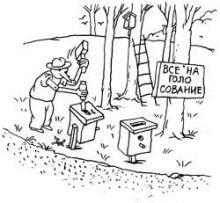About one million Ukrainians will not be able to cast their votes in the parliamentary and local council elections due to limitations in the election law, Ihor Popov, chairman of the Committee of Ukrainian Voters (KVU), told a press conference in Dnipropetrovsk. Among them are members of election commissions, observers, and law- enforcers who will be on duty at polling stations on Election Day. “To vote at the place of residence, they must be given absentee voter status, but the law prohibits this,” Popov noted. Especially tough limitations have been imposed on election commission members. “While it is possible to solve this problem with respect to police and political parties by way of replacing their representatives in accordance with a respective Central Electoral Commission (TsVK) instruction,” the KVU chair says, “members of local election commissions have no right at all to leave their polling stations because they are responsible for keeping safe the ballots they receive: they take a written pledge to do so.” Therefore, quite a large number of voters will not be able to make use of the right to vote guaranteed by the Constitution.
The KVU chair said he had already informed the TsVK and the Verkhovna Rada leadership about this defect in the current election law. Popov himself thinks there may be several ways of solving this problem at the legislative level, including making out “special absentee ballots” which will allow commission members, observers, and policemen to vote at the stations where they are on duty.
In Popov’s view, the Ukrainian election law has a number of other flaws. For example, he considers the procedure of counting Verkhovna Rada and local council ballots as “unclear.” “If you count the ballots, starting with those of the Verkhovna Rada, strictly in compliance with the law, then local council ballots should be treated as ‘other objects’ that somehow got into the ballot box and be placed under close guard.” In this case it may take 24 hours to count the votes if all procedures are to be adhered to. Besides, the commission chairman accompanied by a policeman is to take the polling reports to each council in different places: otherwise the commission’s work will be paralyzed.
The KVU chairman sees one more factor that can disrupt the smooth work of election commissions. “It turned out,” says Popov, “that far from all parties, even the ones that are leading in these elections, can furnish a sufficient number of their people to fill vacancies in local election commissions.” In his opinion, many parties have so far been doctoring their membership statistics. “Officials in the provinces pretend not to see this problem; they say they don’t want to interfere with the elections, so it is not ruled out that many election commissions will be understaffed.”
At the same time, the government begins to activate its work with voters. “There is a video film at our disposal that shows Zaporizhzhia authorities forcing public-sector employees to support a certain political force,” Popov said. In this connection, the Committee of Ukrainian Voters has already sent a complaint to President Viktor Yushchenko.







